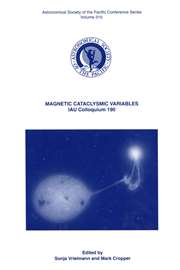No CrossRef data available.
Article contents
Interstellar Dust and the H2 Molecule
Published online by Cambridge University Press: 08 February 2017
Extract
Nearly 20 Years Ago van de Hulst stated that the formation of molecular hydrogen occurs on the surfaces of the interstellar grains. (See ref. 1.) In the last years several authors discussed the problem of the interstellar abundance of the H2 molecule. (See refs. 2 to 9.) They all found that the percentage of the molecular hydrogen in the interstellar gas probably is much larger than had been thought in the past and that the essential mechanism of H2 formation is the formation on the particle surfaces. Therefore, the formation rate of interstellar H2 is a function of the area of the grain surface per unit volume, which is dependent on the average radius of the grains ā, on the number of dust particles per unit volume N(ā), and on the distribution function of the particle radii. The formation rate is determined by the density of the atomic hydrogen nH and the temperature of the interstellar gas Tgas. Finally, the formation rate of H2 depends on the probability π that an impinging hydrogen atom on a grain joins with another hydrogen atom to form a molecule.
Information
- Type
- Research Article
- Information
- International Astronomical Union Colloquium , Volume 7: Proper Motions , August 1965 , pp. 259 - 264
- Copyright
- Copyright © Kluwer Academic Publishers 1965

